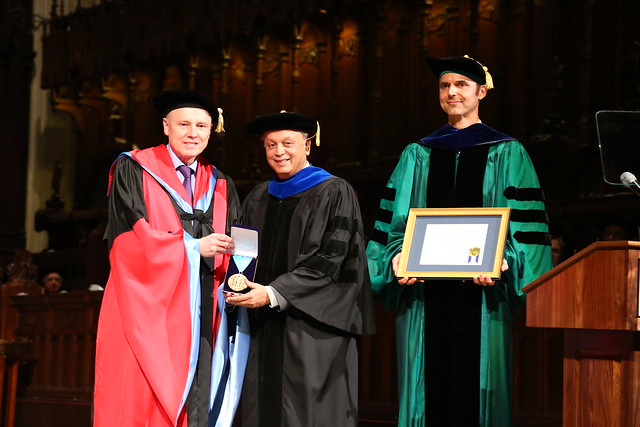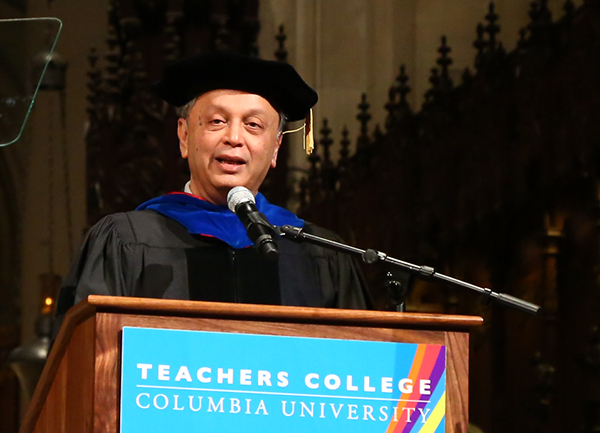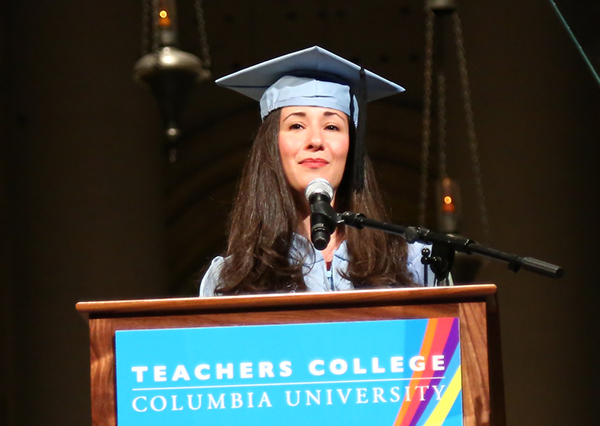The Power of Citizen-Leaders: At TC’s third master’s degree ceremony, paeans to those with the courage to follow their hearts and also listen to others

“The old proverb that it takes a village to educate a child is true, no matter how old the child,” said Madhav Chavan, recipient of TC’s Medal for Distinguished Achievement, addressing graduates from TC’s departments of Human Development, International & Transcultural Studies, Math, Science & Technology, and Organization & Leadership.
As head of Pratham, India’s largest non-government provider of basic literacy and numeracy for underprivileged children, Chavan has enabled millions of children to read and prompted the government to set new accountability standards for what students in elementary school must learn in each grade.
But to eliminate “the contradictions between what young people want to do in life and what the system is offering,” he said, those who will serve as “the village” for future generations must rethink the linear, assembly line-style education created by the Industrial Revolution. At the same time, such work can benefit from taking a page or two from the playbook of past visionaries. Chavan cited a personal hero: Bhimrao Ramji Ambedkar, India’s first Minister of Law and Justice (and a Columbia University alumnus), who was born into one of India’s “untouchable” castes and rose to lead the writing of the nation’s constitution and the elimination of untouchability itself.

TC President Susan Fuhrman invoked the view of the late Morton Deutsch, the great TC social psychologist and founder of the field of conflict resolution, that “violence and war are potentials of humans, but they are not inevitabilities.”
Fuhrman paid tribute to 18 military officers (“citizen leaders,” she called them) receiving their master’s degrees in Social-Organizational Psychology from TC’s Eisenhower Leader Development Program, a unique partnership with the U.S. Military Academy at West Point.
TC President Fuhrman saluted one graduating student for "building civic strength and pride as an immigration and public education advocate," adding, "we need more citizen leaders like you."
Despite or perhaps because of serving in of the world’s most dangerous regions, under conditions that often require split-second decision making, Fuhrman said, these four women and 14 men are united by “a passion for creating a stronger culture of communication and participatory leadership in the military.”
Fuhrman also spoke about Maried Rivera Nieves, a graduate in International and Comparative Education, who has similarly found her way by listening to others. Nieves, who left Puerto Rico at age eight for a new life in Minnesota, struggled for many years with a sense of “neither-here-nor-there-ness.” That feeling changed after college, however, when she worked with refugees from Somalia and Myanmar and volunteered teaching English as a second language. At TC, Fuhrman said, Nieves has learned to “become the best advocate she could be for people who were physically and emotionally displaced.” Now she will help others “build civic strength and pride as an immigration and public education advocate.
“Maried,” Fuhrman said, “we need more citizen-leaders like you!”
The graduates also heard from student speaker Jamie Librot, who was receiving her master’s degree in Social-Organizational Psychology. Like Chavan, Librot seemed to suggest that a linear, solely achievement-based approach is insufficient to meet the challenges of life in a complex world.

“My achiever instinct was to go right back to work,” she recalled. “Fortunately, I had some wonderful partners: my husband, my family, and my colleagues at Gallup, who insisted that I take a full two months off work to recover.”
During that time, she took care of her then-two year old daughter, Lucy, and went on to have another daughter, Lydia, who was in attendance at Convocation.
“What I have learned through my experience at TC is that success is not about acing tests and getting good grades,” Librot said. “Success is understanding what really matters to you and putting your time there.”
Related Stories
Published Wednesday, May 17, 2017